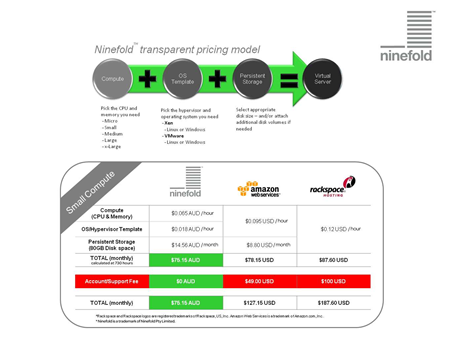Sydney-based IaaS provider Ninefold today announced changes to its pricing structure in an effort to attract customers from large-scale cloud computes based overseas.
The start-up reduced the size of its smallest compute instance – launching the “Micro Instance” – the most bare-bones version of which will cost around AUD$0.04 per hour.
The new “micro instances” start at 1 CPU, 384 MB RAM and 80 GB Storage.
For comparison, Ninefold’s smallest compute instance upon launch was 1 CPU, 1.7GB RAM and 160 GB of storage.
The new micro instances best suit “low volume, low traffic applications” that run on a single OS instance, the company said.
Ninefold accompanied the announcement with a pricing chart that pitches Ninefold as a cheaper alternative to Rackspace and Amazon.com for one specific, small Linux instance.
The company had previously bristled at calculations made by this publication that pitched Ninefold as among the cheapest providers in Australia, but still a 20 to 30 percent premium on foreign providers.

Ninefold supplied iTnews with specifications for each of these instances for a more detailed comparison.
- The Ninefold instance is 1 CPU (equivalent 1.2-2.8GHz) with 1.7GB RAM and 80GB persistent storage.
- The Amazon Web Services instance is 1 CPU (equivalent 1.0-1.2 GHz), with 1.7GB RAM and 80GB Elastic Block Storage.
- The Rackspace instance is 2GB RAM, an undisclosed number of CPU cycles, with 80GB storage.
What is missing from the comparison is the high cost of internet bandwidth in Australia.
- Ninefold charges $0.90/GB outbound and currently offers inbound traffic free as a promotional offer.
- Amazon Web Services (Singapore) charges $0.19 outbound and $0.10 inbound.
- Rackspace (US) charges $0.18 outbound and $0.08 inbound.
“Ninefold’s local Australian internet bandwidth charges are extremely competitive within Australia, and provide huge customer benefits of fastest local latency, multi-carrier fastest route, local data jurisdiction and local support,” said Ninefold managing director, Peter James.
What do you think? Do you consider this pricing transparent and comparable to services supplied overseas? What premium would you be prepared to pay for faster speeds, local storage and local support?








.jpg&h=142&w=230&c=1&s=1)




.jpg&w=100&c=1&s=0)








_(1).jpg&q=95&h=298&w=480&c=1&s=1)


